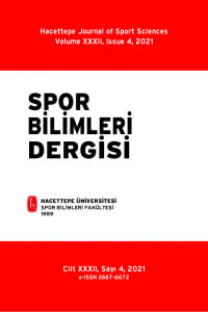Spor tüketiminde pazarlama bileşenleri: Ölçek geliştirme
Spor tüketicilerini, onların davranışlarını ve spor yönetimindeki spor kavramını anlamak spor yöneticileri ve spor pazarlamacıları açısından son derece önemlidir. Aksi takdirde, ellerinde yeterli derecede spor endüstrisi ve spor tüketicileri hakkında bilgileri olmayan spor yöneticileri ve spor pazarlamacılarının çalışmaları olumsuz yönde etkilenebilecektir Spor pazarlama bileşenleri dinamiklerini araştırmak isteyen her çaba tüketicilerin perspektiflerini göz önüne alarak pazarlama bileşenlerinin neler olduğunu ortaya koymalıdır. Böyle bir analiz, spor tüketicilerinin spor pazarlamasının farklı kavramları hakkındaki algılamalarının ölçülmesiyle başlamalıdır. Bu çalışmanın temel amacı spor tüketicilerinin spor pazarlaması bileşenleri hakkındaki görüşlerini ölçebilecek bir psikometrik ölçek geliştirmektir. Bu ölçüm aracını geliştirmede izlenen basamaklar, uzman görüşleri, alan testi, pilot çalışma ve doğrulama analizlerini içermektedir. Bu çalışmaya 379 (212 erkek ve 167 bayan) spor tüketicisi katılmış olup, çalışma gurubu düzenli olarak spor aktivitelerine katılan gönüllüler arasından rasgele yöntemle seçilmişlerdir. Çalışmaya katılan spor tüketicilerinin yaş ortalamaları 27 ± 8 yıl olarak bulunmuştur. Toplanan veriler faktör analizi kullanılarak değerlendirilmiş olup, bu analizler sonucunda ölçeğin alt boyutları belirlenmiştir. Spor pazarlaması bileşenleri ölçeğinin başlangıçta 24 olan madde sayısı sekiz anlamlı faktör çözümünü olarak saptanmıştır. Bu faktörler (1) Tesisin konumu, (2) Halkla ilişkiler, (3) Personel, (4) Kullanım Bedeli, (5) Promosyon, (6) İletişim, (7) Ürün kalitesi ve (8) Ulaşım olarak belirlenmiştir. Bütün bu faktörler toplam olarak % 73,40 varyansı açıklamakla birlikte, ölçeğin alt boyutlarının güvenirlilik katsayıları (Cronbach alfa "a") en düşük 0,56 ve en yüksek 0,74 olarak gerçekleşmiştir. Bütün bu sonuçlar daha geniş kapsamlı olarak ele alınıp tartışılmıştır.
Marketing mix in sport consuming: Development of an instrument
It is very important that sport management and sport marketing person should understand sport consumers, their behavior, marketing and the concept of sport used in the field of sport management and sport marketing. Otherwise, sport marketing professionals do not have precise information about sport participants and true vision of the sport industry. Any useful attempt to study dynamics of sport marketing mix should begin with the assessment constituents' perspectives on what constitutes marketing mix. Such analyses should begin with the measurement of the various concepts of sport marketing held by sport consumers. Thus, the purpose of the present study was to develop a scale of sport marketing mix applicable to Turkey settings. In other words, this study examined the development of an instrument to assess the views of held by sport consumers. The steps in the development of the instrument and the assessment of its psychometric properties included the use of panel of expert, a field test, a pilot test, and a confirmatory study. The study was conducted among 379 sport consumers (212 males and 167 females) who were volunteered and randomly selected from the group of people regularly involved in sport activities. The mean age of the sport consumers was 27 ±8 years old in the study. By using principal component analysis with varimax rotation, the construct validity of the scales was confirmed. While 24 initial items of sport marketing mix scale resulted in an empirically supported eight-factor solution; (1) Location of the facility, (2) Public relation, (3) Staff, (4) Price, (5) Promotion, (6) Communication with customers, (7) Quality of the services and products, and (8) Traveling time. These factors cumulatively explained 73.40% of the variance. Also, the internal consistency estimates (Cronbach's alphas "a") of subscales ranged from .56 to.75. These results were further elaborated and discussed.
___
- Ary, D., Jacobs, L.C. & Razavieh, A. (1996). Introduction to Research in Education. (5. Baskı). Forth Worth: Harcourt Brace College Publishers.
- Assael, H. (1995). Consumer Behavior and Marketing Action. Cincinati, Ohio: South-Western Collage Publishing.
- Cemalcılar, I. (1987). Pazarlama, Kavramlar, Kararlar. Istanbul: Beta Basım Yayım Dağıtım A.Ş.
- Challadurai, P. (1999). Human Resorce Management in Sport And Recreation. Champaign, İL: Human Kinetics Publishers.
- Dickson, P.R. (1993). Marketing Management. Philadelphia, The Dryden Press Harcourt Brace Collage Publisher.
- Ekenci, G. & Imamoğlu, A.F. (1998). Spor İşletmeciliği. Alp Ofset Matbaacılık Ltd. Şti. Ankara.
- Fox, L. (1969). Data collection. New York, NY: McGraw-Hill Inc.
- Kurtuluş, K. (1981). Ülkemiz koşulları ve pazarlama. Pazarlama Dergisi. 6(2), 3-10.
- Mucuk, I. (1998). Pazarlama İlkeleri. İstanbul: Türkmen Kitabevi.
- Mullin, J.B., Hardy, S. & Sutton, W.A. (1993). Sport Marketing, Champaign. IL: Human Kinetics Publishers.
- Pitts, G.B. & Stotlar, K.D. (1996). Funde-mentals Of Sport Marketing. Morgantown, WV: Fitness Information Technology, Inc.
- Slack, T. (1997). Understanding Sport Organizations: The Application Of Organization Theory. Champaign, IL: Human Kinetics Publishers.
- Stevens, J. (1992). Principal Components: Applied Multivariate Statistics for the Social Sciences (2nd edition). Hillsdalel, NJ: Prentice Hall, sf.383.
- Tabachnick, B.G. & Fidell, L.S. (1989). Using Multivariate Statistics (2. Baskı). New York: Harper Collins Publishers
- Wells, W.D. (1993). Discovery-oriented consumer research. Journal of Consumer Research, 19 (1), 489-504.
- Wolf, M.J. (1999). The Entertainment Economy: How mega media forces are transforming our lives. London: Penguin Publishers.
- Yalçın, H.B. (2001). Role Clearity, Role Preferences, Perception of task characteristics and job satisfaction among sports managers in Turkey. 9. EASM Congress, Vitoria-Gasteiz, Spain. 19-23 September, 366-368.
- Zikmund, G.W. & d'Amico, M. (2002). Effective Marketing; Creating and Keeping Customers. Mineapolis/St.Paul: West Publishing Company.
- Başlangıç: 1990
- Yayıncı: Süleyman BULUT
Sayıdaki Diğer Makaleler
SPARDA GÜDÜLENME ÖLÇEGI -SGÖ-"NIN TÜRK SPORCULARı IÇiN GÜVENiRLIK VE GEÇERLIK ÇALIŞMASI
SPOR TÜKETİMİNDE PAZARLAMA BİLEŞENLERİ: ÖLÇEK GELİŞTİRME.
Hasan Birol YALÇIN, Bekir YÜKTAŞIR, Zafer DOĞRU
Spor tüketiminde pazarlama bileşenleri: Ölçek geliştirme
Hasan Birol YALÇIN, Zafer DOĞRU, Bekir YÜKTAŞIR
"Sporda güdülenme ölçeği -SGÖ-" nin Türk sporcuları için güvenirlik ve geçerlik çalışması
SPARDA GÜDÜLENME ÖLÇEGI -SGÖ-"NIN TÜRK SPORCULARı IÇiN GÜVENiRLIK VE GEÇERLIK ÇALIŞMASI
Şeref ÇİÇEK, Levent M. İNCE, İrmak HÜRMERİÇ, Leyla SARAÇ, Ahmet YILDIRIM
Leyla SARAÇ, Irmak HÜRMERİÇ, Şeref ÇİÇEK, Levent M. İNCE, Ahmet YILDIRIM
